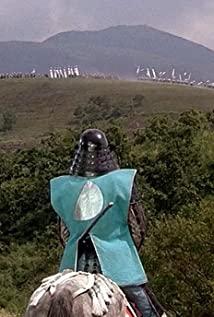"As fast as the wind", "as quiet as the forest", "as fierce as fire", "as steady as a mountain"
"First, the cavalry, like the wind, launched a quick attack. Then the infantry raised their spears. They advanced quietly like a forest. Finally, the cavalry swept the enemy like fire. The lord always watched the battle from behind, standing like a mountain. move."
This is also a complete explanation of the Takeda clan's slogan to the stand-in and Shingen's grandson in the middle of the movie.
The film is mainly about the "mountain". The Takeda family relies on the "mountain" and Shingen to make the country continue to develop and strengthen, and increase the deterrence of other countries. However, the Takeda family always needs to rely on this "mountain" to continue to develop, which will inevitably lead to the "mountain" and the demise of the country. This is also the story of this movie.
The stand-in is a clue for the movie, a thief was found by an old minister as a stand-in for Shin Hyun. From the beginning, he couldn't bear to "be" Shingen all the time, until he was moved by the loyal ministers of these old ministers, and he also decided to sacrifice himself for his own country for the life and death of this country. This spirit is what Kurosawa Akira wanted to talk about. A romantic collectivism that sacrifices itself for the sake of the group. From a real mountain down, to a stand-in sacrificing his life into a rockery to support the country. However, when the identity was finally revealed, the last rockery in the country fell, and the substitute was cast aside by others and left. In the end, Sheng Lai raised troops to attack other countries, and he never stood still like a mountain, but was anxious to find prestige for himself. In the end, the entire army was wiped out, and the original generation of powerful countries no longer existed. The avatar finally appeared on the battlefield to watch the battle. He was extremely saddened by this tragic situation. He walked to the battlefield full of soldiers' corpses, picked up the spear that fell on the ground, and walked in the vast sea of corpses. In the face of the menacing enemy, his roar is more like Shingen, more like the last stubbornness of the country's demise.
There is very little positive description of Shingen in the whole movie, but we can realize through the performance of the stand-in that Takeda Shingen is prudent, courageous, and has the overall situation, and it also makes me better understand Shingen's contribution to Takeda, his shock to the enemy, and his suffering. the love of the people. At this moment, it was like seeing Shingen's shadow or even himself.
The stand-in finally went to the home of Shingen - the sea, and floated to the ocean together with the flag of the Takeda family slogan.
The sublimation of this ending moved me very much. This kind of romanticism is very rare in today's egoistic society. This ending reminds me of the soldiers going down the stairs at the beginning. There is no repetitive scene or scene, and the director is not boring to play down the stairs simply. It also reflects the strength of the Takeda family, and it also gives us a general understanding of the background. This end-to-end echo also made us feel full of emotion, the collapse of the building was so rapid.
The time of this movie happened just as Japan's real estate bubble was getting bigger and bigger, and the illusion of rapid economic development in Japan made all Japanese people live a splendid life. The news was all about how to make more money. In this impetuous life, the spirit expressed by the director is so precious. Coincidentally, after Japan, the bubble was punctured, the Plaza Agreement was signed with the United States, and the yen also depreciated significantly. This bubble is like the mountain of Takeda's family, which will collapse at any time because of the collapse of the mountain....
View more about Kagemusha reviews










